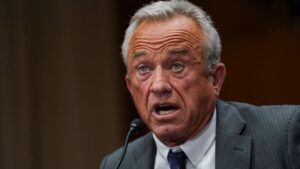The Health Policy Landscape: Insights from Robert F. Kennedy Jr.’s Senate Hearing
In a politically charged atmosphere, the nomination of Robert F. Kennedy Jr. to lead the Department of Health and Human Services (HHS) raises critical questions about the future direction of U.S. healthcare policy. During his recent confirmation hearings, Kennedy faced pointed scrutiny over his grasp of essential health programs, particularly Medicare and Medicaid, which are central to the healthcare framework for millions of Americans.
Confusion at the Confirmation Hearing
During his second Senate hearing before the Senate Committee on Health, Education, Labor, and Pensions, Kennedy struggled to articulate foundational aspects of Medicare. Senator Maggie Hassan (D-NH) challenged him directly, stating, "You want us to confirm you to be in charge of Medicare, but it appears that you don’t know the basics of this program." Such a statement underlines the significant implications of appointing a leader without a firm understanding of the very systems they are expected to oversee.
Key Areas of Misunderstanding
At the core of Senator Hassan’s questioning were specific components of Medicare:
- Medicare Part A, primarily designed for inpatient hospital care, was mischaracterized by Kennedy as "mainly for primary care or physicians."
- Medicare Part B, which encompasses outpatient services and preventive care, was described inadequately as "for physicians and doctors."
- Medicare Part C, or Medicare Advantage, which offers private plan alternatives, was confused by Kennedy, who mentioned a "full menu" of services including Parts A, B, C, and D without specificity.
This pattern of responses drew attention not just to Kennedy’s qualifications, but also to the critical importance of knowledge in effectively managing a $1.7 trillion agency that encompasses the Centers for Medicare & Medicaid Services (CMS).
The Stakes of Oversight
If confirmed, Kennedy would oversee a critical agency responsible for the well-being of various vulnerable populations, including seniors, disabled individuals, and low-income families. The stakes are incredibly high, particularly as Republican strategies to reduce federal spending might target vital programs like Medicaid. This could potentially threaten the care of approximately 80 million Americans who rely on the program, which incurs substantial costs exceeding $600 billion annually.
Moreover, with Kennedy having misstated details during his testimonies—initially declaring Medicaid as "fully paid for" by the federal government—his lack of familiarity raises concerns about potential mismanagement and policy formulation moving forward.
What This Means for the Future
As we look ahead, Kennedy’s confirmation looms large over the future of U.S. healthcare policy. The implications are threefold:
- Policy Formulation: Kennedy’s ability—or lack thereof—to navigate complex healthcare intricacies could shape policies affecting millions.
- Funding Strategies: The current budgetary landscape may force infeasible cuts to Medicare and Medicaid, impacting patient care and health outcomes.
- Public Trust: Misunderstandings at this level could erode public confidence in the leadership of HHS, particularly during a time when effective public health response is crucial.
Conclusion
It’s essential for stakeholders to be attuned to these developments. An informed public can advocate for transparency and competence in leadership roles that directly affect their lives. At Extreme Investor Network, we emphasize the critical nature of informed decision-making in healthcare and encourage our readers to remain engaged with these pressing issues that could redefine the landscape of American healthcare for years to come.
Stay tuned with us for more insights and updates as this story unfolds, and understand why expert oversight in healthcare is not just a bureaucratic necessity but a lifeline for many.

